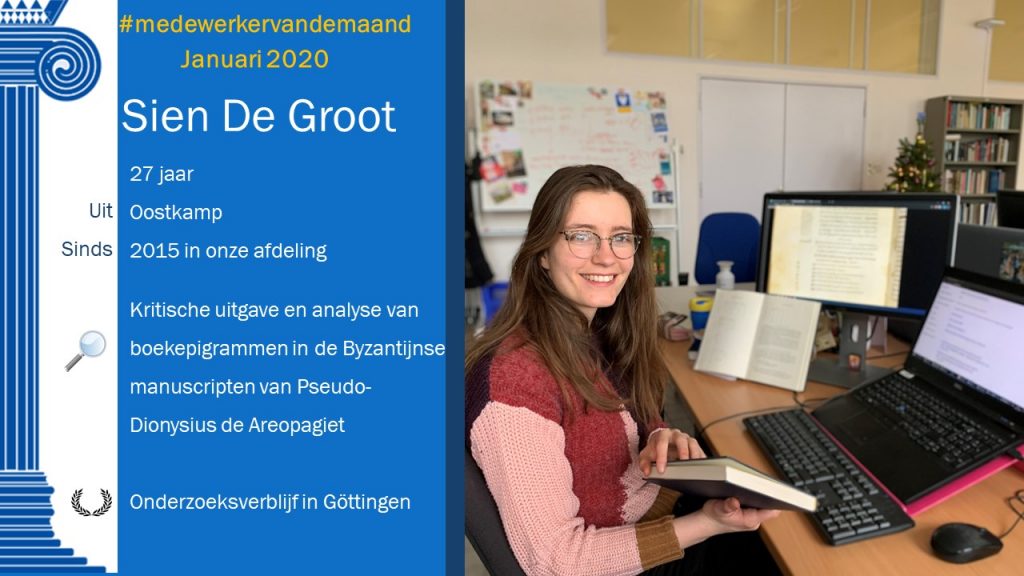Interview by Maria Tomadaki:
I am pleased to have a discussion with our current staff member of the month (#medewerkervandemaand), Sien De Groot, a beloved and very active member of our Greek section. Sien is currently preparing a PhD thesis on Byzantine book epigrams and in the past few years she has taken an active role in our section through various roles: as a teacher of ancient Greek, secretary of Het Griekenlandcentrum, coordinator and organizer of children’s workshops and other events (e.g. the Emeritus ceremony in honor of her supervisor, Marc De Groote), and most importantly as a devoted PhD student full of philological skills, energy and altruism.
 Hello, Sien! Tell us about the topic of your PhD thesis and its relation to the Database of Byzantine Book Epigrams?
Hello, Sien! Tell us about the topic of your PhD thesis and its relation to the Database of Byzantine Book Epigrams?
Hello, Maria! My PhD thesis deals with book epigrams, poems that were added to the main texts of Byzantine manuscripts. Over the last years, I have been hunting for such epigrams in manuscripts of Pseudo-Dionysius the Areopagite, a rather obscure and anonymous theological author from the early sixth century. I am now preparing an edition and analysis of these poems. As such, I have always (with much, much pleasure) been working on the Database of Byzantine Book Epigrams: I have added numerous transcriptions and other data to the corpus, and have enjoyed the time spent in our cozy team office, together with our very nice group of colleagues.
You have recently spent two months in Germany for a research stay at the University of Göttingen. Was this a fruitful and pleasant experience?
It certainly was! I am very thankful to the University of Göttingen and the Akademie der Wissenschaften for giving me this opportunity. I have experienced those two months as quite an intense period: I spent most of my time in the excellent theology library, writing as much as I could. The last two weeks of my stay, I consulted a large collection of microfilm images of manuscripts, which hugely enriched the material I had already assembled. I was also invited to a research seminar, in which several doctoral students were reading and discussing theological passages by Pseudo-Dionysius – this is not an easy task: his writings are sometimes quite obscure and difficult to be understood, but the reading group managed to make the texts both understandable and pleasant. Moreover, I was very lucky to find a nice home shared with five housemates, who provided me with the necessary warmth and relaxation during evenings and weekends. They even taught me how to bake sourdough bread, a skill that I was not expecting to take home from a research stay: I’m baking a fresh bread once a week now!
I am now preparing an edition and analysis of the epigrams in Pseudo-Dionysius the Areopagite. As such, I have always (with much, much pleasure) been working on the Database of Byzantine Book Epigrams: I have added numerous transcriptions and other data to the corpus, and have enjoyed the time spent in our cozy team office, together with our very nice group of colleagues.
As this is the final year of your PhD thesis, do you have any thoughts about future plans?
Right now, I am trying to focus on finishing my thesis and not to look too far ahead – first things first. There are several options: I could apply for a post-doc position, which would certainly be related to Byzantine manuscripts: they are my favorite topic! Other than that, I would also like to teach in a secondary school. I have always enjoyed offering our workshops to children, and I think that teaching Greek and / or Latin to young people is a very interesting and rewarding experience.
I was invited to a research seminar, in which several doctoral students were reading and discussing theological passages by Pseudo-Dionysius – this is not an easy task: his writings are sometimes quite obscure and difficult to be understood, but the reading group managed to make the texts both understandable and pleasant.
Would you like to visit Greece one day and learn more about the Greek language and culture?
Of course my answer is ναι! I am slightly ashamed to admit it, but after having studied Greek for almost ten years now (I even took up some modern Greek), I have still not visited Greece. I would love to make a long road trip through Greece and its islands after finishing my PhD, to visit all of those famous and less-famous places, and experience the warmth of the Greek sun and the Greek people. And, of course, eat a lot of good Greek food… 😉